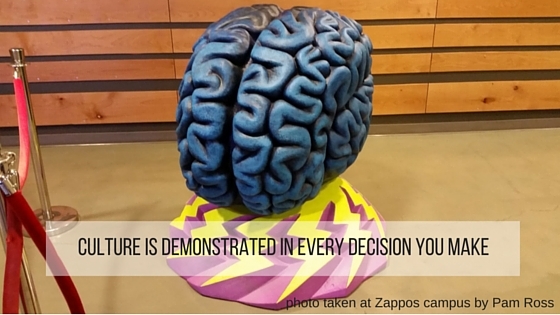Culture is not about values posted on a wall. Culture is about living your values even when it's extremely difficult. It is about using your values and purpose as a filter for decisions and daily actions. 
I recently had conversations with two different CEOs who made difficult decisions to remove members of their leadership team because their behaviour did not align with company values. For one of them, this meant removing family members. These decisions are not easy to make, but when you truly believe in your values, they guide you to make the right decision even when it is this tough.
When you consider companies with strong culture, pride in their brand, and ultimately tons of success, you can identify some of the difficult decisions they've made because of their values and culture.
Culture and Difficult Decisions at G Adventures
G Adventures is a great example. I've written about their culture in the past - it is almost palpable when you visit BaseCamp (their head office) or travel with them. One of their core values is Do the Right Thing. There is a story that their founder, Bruce Poon Tip, shares in his book LoopTail:
Once we had a group of people in our office who started talking about customer deposits on trips and how, when something happens in their lives that prevents them from going, we keep the deposit. They asked, "Isn't that taking advantage of people's misfortune?
This practice of keeping deposits is standard in the travel industry (if you've ever traveled with a different company and had to cancel, you'll know you don't get your deposit back. But the employees challenged this practice, saying "That's not Doing the Right Thing".
So now, when you travel with G Adventures, your deposit is yours - you can apply it to a new trip, give it to someone, or donate it to their Planeterra foundation - you don't lose that money. Decisions like creating the "lifetime deposit" impact your bottom line, but help to make your values clear to people.
Culture and Difficult Decisions at Zappos
Values drive decisions at Zappos, too. As Tony Hsieh shares in this article, "We flipped a switch and we lost 25% of revenue," when they decided that Customer service was their ultimate purpose - delivering happiness. They moved all warehousing in house versus the easier and more profitable route of using outside warehousing and shipping. This way, they could control the customer experience and meet their mission of happiness.
Of course, Zappos also puts their money where their values are when it comes to hiring and to new ways of working. They pay people one month's salary to quit after the first three months if they don't love the culture. Zappos also recently made headlines, after moving to a Holocratic work environment, to pay people a minimum three month's salary to leave if Holacracy was not for them. 14% of employees left - which may sound like a lot, but it means 86% of people chose to stay, even given the huge change the organization was going through, which is a testament to the strength of their culture.
How Difficult Decisions Help Build Culture
Difficult decisions like these become an example for people in your organization. They become stories that are told over and over, and it makes it clear to everyone what is truly important, giving them autonomy to make the right decisions that are aligned with your culture and purpose when it's their turn. Employees at G Adventures and Zappos know the sorts of decisions their founders have made for the good of their Values and Culture, and this makes it much easier for them to make the every day decisions they must while serving their customers and working with colleagues.
Take a moment to consider a time when it was difficult to at in alignment with your values or the company's values. What did you do? Did you stay true to the values or did you make the decisions based on profitability, revenue, shareholder pressure? If culture is truly important, you'll find that you are acting in alignment with the values more often and that is what will grow your culture - not a poster on the wall.
